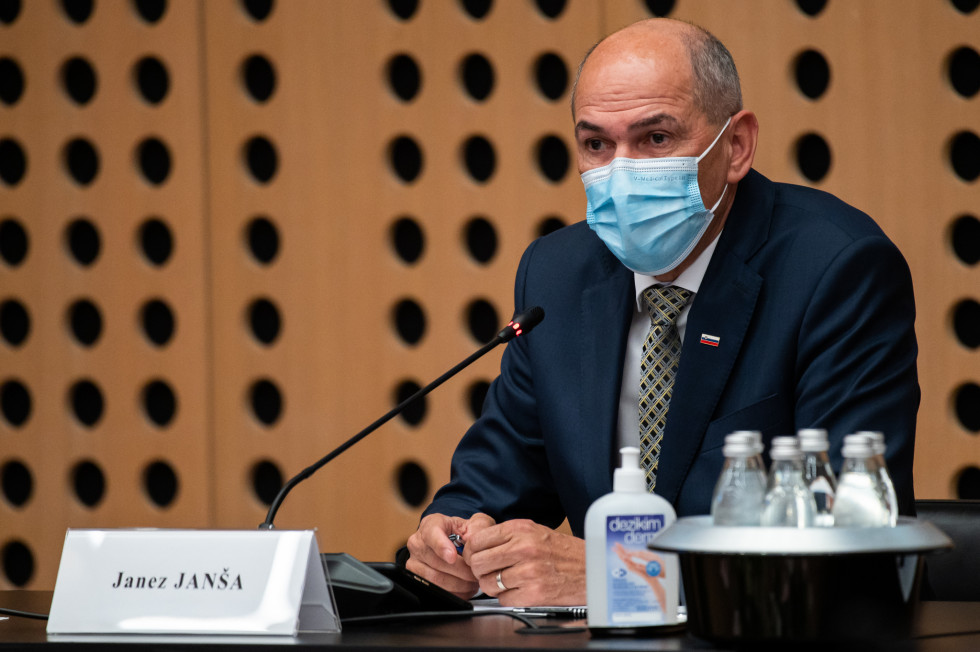By: UKOM
Yesterday, Prime Minister Janez Janša attended the 25th annual Consultation of Slovenian Diplomats at Brdo pri Kranju, where he addressed ambassadors of the Republic of Slovenia and high representatives of the Ministry of Foreign Affairs. Consultations are taking place in the last month before Slovenia will assume the Presidency of the Council of the European Union. In his address to diplomats, the Prime Minister spoke about the current situation in the world after the pandemic, the issues Slovenia has faced and is still facing, the enlargement of the European Union, the challenges that lie ahead, even during the Presidency of the Council of the European Union, the future and the stabilisation of Europe.
By way of introduction, Prime Minister Janez Janša outlined the situation in the world in which diplomats represent Slovenia’s interests. He pointed out that we are still in a pandemic, which has significantly changed international relations and further accelerated some trends that were already becoming apparent. During this time, certain countries and continents have lost the momentum of development and economic growth, while others have gained it. The emerging bipolarity, in which two dominant superpowers will prevail, is even more undeniable than before.
As part of the European Union and the European monetary union, Slovenia has faced a number of challenges brought on by the pandemic, including a drop in economic growth. According to the Prime Minister, the pandemic has broken certain illusions, for instance that the world is a global place and that whatever is lacking at home can be obtained anywhere. Internal cohesion and solidarity within the European Union have also been tested. “It is difficult to share, when you have nothing.”
He continued by pointing out that the European Union was insufficiently prepared for a pandemic, despite the warnings of the World Health Organisation, which also prepared recommendations for Slovenia in 2017. In particular, there were no clear plans for measures that would allow for stable action based on the pandemic experience to date. The European Union has been struck by disaster in turbulent times, a period of recovery after the financial and economic crisis and the strengthening of the euro on the one hand and the contraction of the European Union and Brexit on the other hand. According to the Prime Minister, we will continue to deal with the contraction and the question of how to reverse this trend. The enlargement of the European Union has strengthened the economy, enabled the expansion to new markets and ensured considerable economic growth.
He expressed hope that we were facing a period when the pandemic would end, when Brexit would become history, a period in which we would have to address the issue of how to put the European Union’s enlargement back on the top of the agenda. According to the Prime Minister, it has to become clear that, if the European Union is not expanding on the European continent, someone else is. Enlargement is a strategic response to various challenges. “What Turkey is doing with some policies in the Balkans is putting a foot in the door when it comes to enlargement.” Slovenia will try to solve this dilemma in the coming months. In the European Union, most countries are in favour of enlargement, however, some countries, including some large ones, see issues with the enlargement of the EU. Europe is capable of resolving this, but only if it does not face a new crisis. Mr Janša believes that this could be one of the strategic goals of the Slovenian Presidency of the Council of the European Union. “If Europe addresses enlargement, it will spend less time addressing fictitious problems,” he maintained.
The Prime Minister pinpointed the green transition and digital transformation as the main challenges of the Council Presidency. The European Union was relatively quick to agree on how to respond to the post-pandemic recovery issues with a comprehensive economic and financial package. In his opinion, reaching consensus on green transition will be considerably more difficult. “We have 27 countries with different economies. A lot depends on how specific issues of individual countries will be tackled from the start,” explained Prime Minister Janez Janša.
The main expectation for the Conference on the Future of Europe will be to answer the question of what Europe will look like in the future, not only in terms of prosperity, but also geographically. The Prime Minister highlighted the possibility of a formal upgrade of the European Union in relation to strategic autonomy and the trends in cyber security. “Considering the real threats we face every week, cyber security is something that no individual country in the European Union can effectively tackle on its own.” According to the Prime Minister, there is a broad consensus that the European Union must build a shared firewall in terms of cyber security. “The key challenge that the European Union and we are facing is for the Europe to stabilise, to get back on its feet and to continue pursuing this strategic goal, which definitely includes enlargement,” concluded Mr Janša.
Source: gov.si

